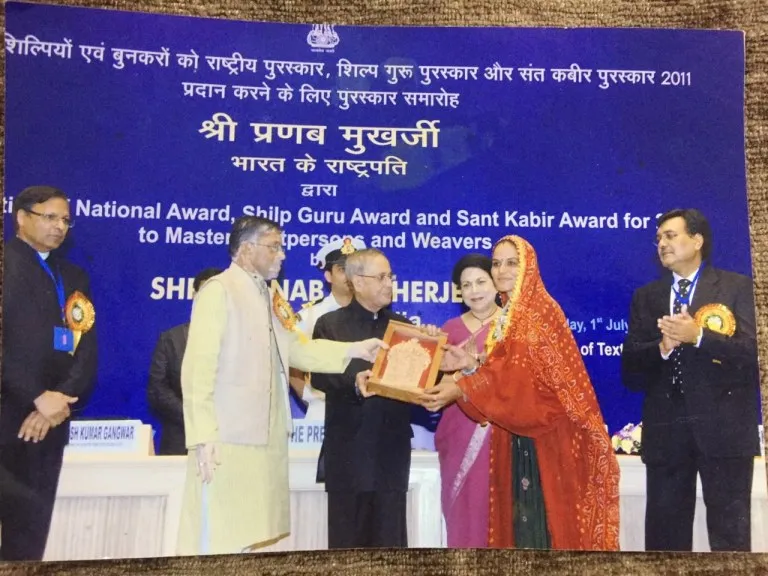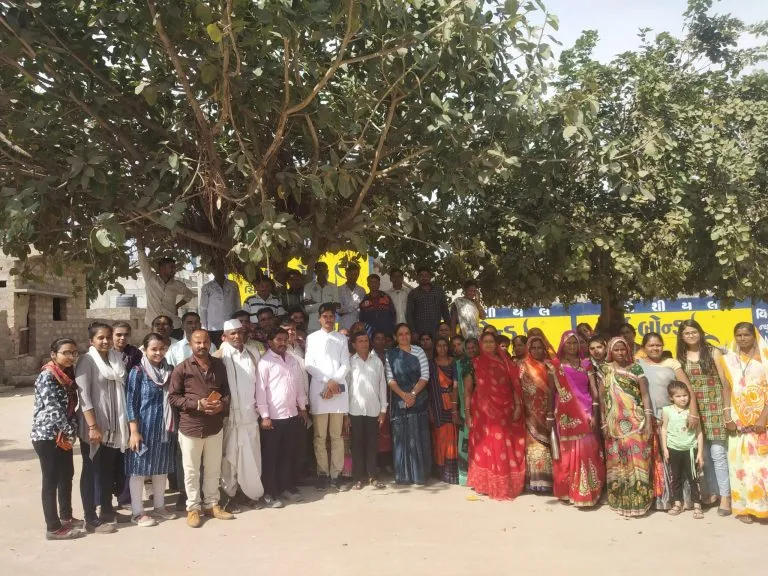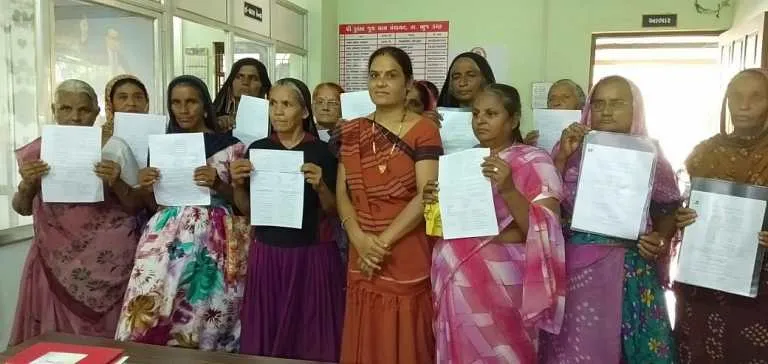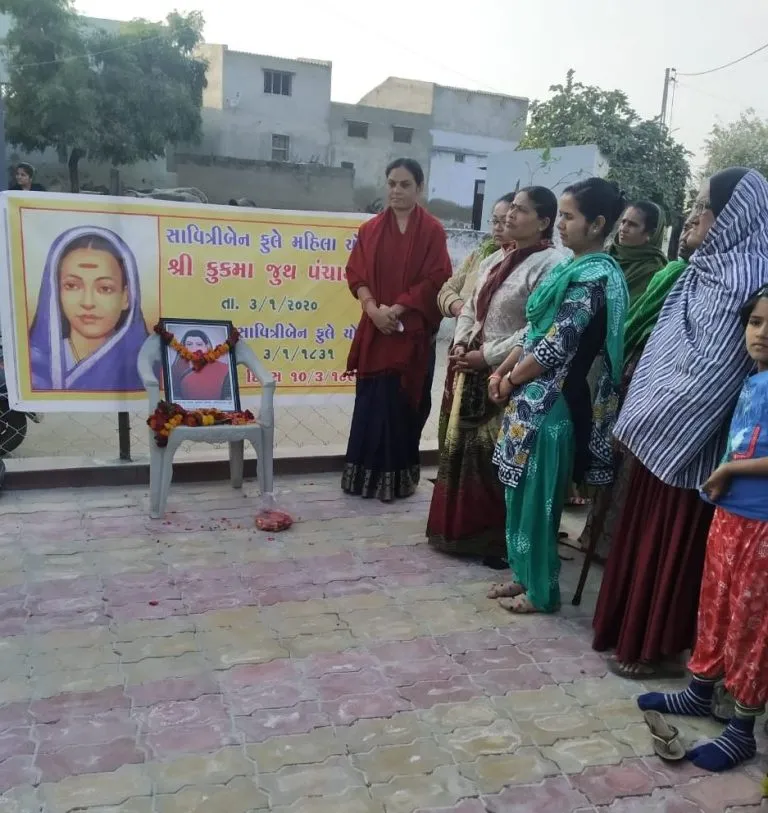

Kanku Ben: A Model Sarpanch in Bhuj, Gujarat
Faraz Ahmad, an India Fellow in an interview with Kanku Ben, an inspiring woman in rural Gujarat who stands tall in the face of all odds, challenges the norms on an everyday basis and sets an example for everyone.
Kanku Ben Amritlal Vankar (will be referred as Kanku Ben here on) is the Sarpanch of Juth (Group) Gram Panchayat that consists of four villages – Kukma, Nani Reladi, Moti Reladi and Lear, in Bhuj, Gujarat. She is an award winning artisan with a long interesting journey full of hard work and dedication that led her to reach where she has reached.
In 2011, the then President of India (Shri Pranab Mukherjee) honoured her with a National Award for her unique design in Toran Art at Vigyan Bhawan, Delhi. In our governance structure, there is this concept of model Gram Panchayat but there is nothing called a model Sarpanch. In fact, the idea itself came to me after being part of various meetings and activities with Kanku Ben. It is not easy to be a Sarpanch, specially not for a woman who belongs to a Scheduled Caste. Such layered are the complications and boundaries of Kanku Ben’s journey!

Kanku Ben while receiving her National Award at Vigyan Bhawan, Delhi in 2011
PERSONAL JOURNEY
Kanku Ben comes from a family where education, more so girl’s education was the least important thing. One big reason for that was the financial situation of her family. Secondly, the school in her village only catered to students until class 7. So if someone wanted to study further, she/he had to travel a long distance. In those days, there was nothing like a free bus pass for girls or any such provisions. It was an expensive deal. "Thus, I studied till 7th and dropped the idea of going to school any further. Subsequently, I started working with my parents, who were artisans. I was a good student, getting either 1st or 2nd division in school till I was there. It made me decide that I will become something (didn’t know what) and will not let at least my children go through this.", Kanku ben recalls.
She continues, "Never even in my wildest dreams I or my family could think that I would become a Sarpanch. I was fortunate that this seat was reserved for someone from Scheduled Caste for the first time and I belong to the category. Had that not been the case, it wouldn’t be possible. Also, I was an active member of the panchayat and used to volunteer for various social welfare programmes. Additionally, through my shop, I was also helping women to get handloom work. It was more a demand that came from people, of me contesting for the post of Sarpanch than me choosing it."

"We are a patriarchal society. This structure applies to all category of women at all levels. Strangely, earlier I did not feel bad about being discriminated. Many girls/women in the village see it as their fate or way of life. But now it hurts me as I am working with various social organisations where I get to meet many people and know how women are being treated. Awareness is also important to identify it. Now we have Mahila Sabha, various committees where issues are raised to a large extent. Even a woman Sarpanch has to work at home and at office or in field. It is expected from her to complete the household work irrespective of her position and other responsibilities."
On being a National Award winner artisan, Kanku Ben says that this has been their profession since a long time. Her parents did the same work. In fact, her father in-law, mother in law and husband are also award winner artisans. She used to create her own designs for competitions in Bhujodi, a few kilometres from Kukma village where Kanku Ben lives. Then she decided to create a masterpiece. It took her eleven months to create this design called Toran. It consisted of twenty two natural colours, all from vegetables and natural oils. The hard work paid off and got recognised by the then President of India (Shri Pranab Mukherjee) in 2011.
EMPOWERING WOMEN
Empowerment may mean different things to different people depending upon the economic and socio-political conditioning in which one lives. Earlier, it may have meant something different to Kanku Ben but now, her understanding is more evolved, given the fact that her position has given her some kind of a privilege. "Women empowerment is basically a step forward, a better stage whether it is economic, social or political; that puts a woman ahead of her earlier stage. It can be achieved through various mediums such as education, decision making power and awareness. For example, I made sure that my daughter would go out of the village to complete her school and also sent her out of Bhuj to complete her higher studies. This was not a unanimous decision in the family but I was determined and it happened.", she says.

A program for women who are widows
When I asked Kanku Ben that how did she get the idea of naming a street on the name of a girl who topped the village school, and why did she feel the need for a women’s park, she told, "It was on my mind that something like this should be done to encourage the girls of our village. In 2018, a special Gram Sabha was called to discuss specific agendas which otherwise, are left out. There again, a similar idea emerged. It was noted down and legally formulated. If we talk about the decentralisation of power which should flow from bottom to top, it should also be reflected at the local level."
Why should every street, road and building be named after Rajas and politicians why not the local people of the village. The result is highly positive. Now the girls feel encouraged and proud.
"Recently, a suggestion was sent by women’s commission in favour of the steps to encourage girls towards naming streets on their names. It feels great that different departments are thinking of something that’s already being done in our villages.", shares Kanku Ben.
As far as women’s park is concerned, it was a vacant land where people would throw their garbage. It had become really polluted causing illnesses and rise in dengue cases. It was also harmful for the environment. Some people wanted to occupy the land. So Kanku Ben decided to take action. After taking permission from the government and following the legal procedure, she and her team took that land under her Panchayat. January 3rd was approaching which is the birth anniversary of Savitri Bai Phule. So they named it after her. Many people asked who is she. To which Kanku Ben says, "I felt that it was the right time to make people aware of her contribution in women empowerment. A session was conducted to talk about Savitri Bai Phule. Now this has become a landmark. People living nearby identify themselves as the residents of women’s park area."

Inauguration of women’s park named after Savitri Bai Phule
VISION, ACHIEVEMENTS AND CHALLENGES
"My Vision is the same as that of Baba Bhim Rao Ambedkar. In fact, now we can talk about rights and livelihoods because he worked hard to provide us with the platform, the vision document i.e. The Constitution of India. Sometimes I think of his struggles and dedication, and tears wouldn’t stop rolling down my eyes. I wish to bring people together, where all the communities are represented equally. Education is important to me. I want to ensure that no one is left behind because of reasons that could be addressed by the Panchayat and other government departments."
"About achievements, well we have worked hard and achieved various milestones. Our idea of achievement or development is not limited to infrastructure. We look into the social issues as well. Education should be a right and not a privilege. When we visited private schools, we saw that the students are taught to operate computers whereas the government schools were still teaching traditional subjects. We contacted a few companies for CSR (Corporate Social Responsibility) funds and got 13 computers for the government school. There is no provision for a computer teacher in public schools. We appointed one from our village, a computer engineer whose salary goes from Panchayat’s fund."
"On challenges, honestly there have been quite a few social and administrative challenges. The processes followed by the panchayat are effective on paper. However, they sometimes don't get implemented by government officials. The secretary of our panchayat gets transferred frequently. It becomes a hurdle in maintaining records, and also makes it difficult to coordinate between the secretary and the Panchayat members. Social change, on the other hand, is a long continuous process. People do understand and improve their practices if it is communicated properly, at a personal level. Any social change is possible only from within the society. Therefore, people of the village should always be the driving force."
The next time you come to Bhuj, include Kukma village on your list of places to visit. Who knows you may get to meet Kanku Ben, and listen to all these stories from her.
About the author: Md. Faraz Ahmad is an India Fellow from 2019 cohort. He is working with SETU Abhiyan in Bhuj, Gujarat as a part of his fellowship. There, he is supporting the team with training and documentation to strengthen rural and urban governance in the area. Faraz loves to talk about the Indian Constitution and Law.







